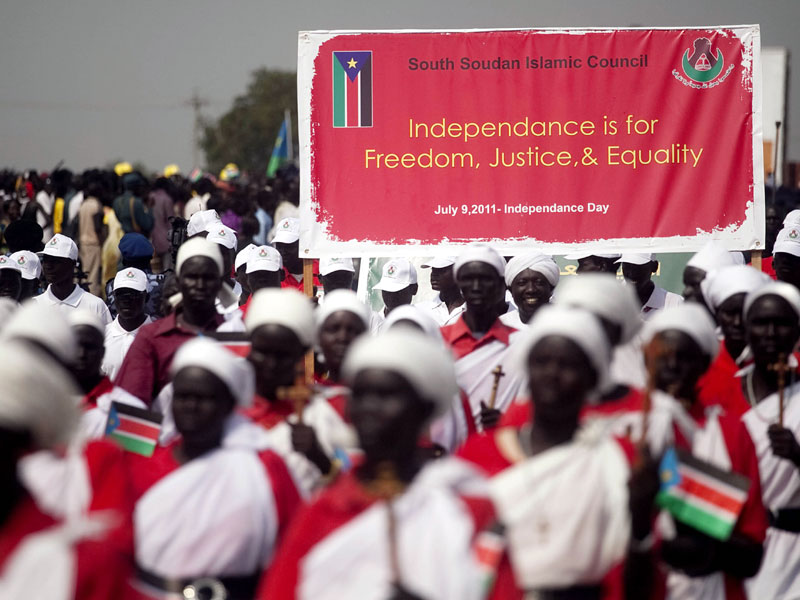Sudan becomes world’s newest nation

Southern Sudanese march and carry signs during a rehearsal for independence celebration, in the southern capital of Juba on Tuesday. AP
JUBA, South Sudan—South Sudanese citizens, international dignitaries and the world’s newest president convened in the new country capital of Juba on Saturday to celebrate the birth of a nation.
South Sudan became the world’s newest country Saturday with a raucous street party at midnight.
Later, UN Secretary-General Ban Ki-moon, former US Secretary of State Colin Powell and dozens of other world leaders will watch under a blazing sun as South Sudan President Salva Kiir hosts a noon-hour ceremony.
“Wow, this is a great day for me because it’s a day that reflects the suffering that all southerners have had for almost 50 years,” said David Aleu, a 24-year-old medical student.
The black African tribes of South Sudan and the mainly Arab north battled two civil wars over more than five decades, and some two million died in the latest war, from 1983-2005. It culminated in a 2005 peace deal that led to Saturday’s independence declaration.
Article continues after this advertisementSudan President Omar al-Bashir, the former leader of the south, is also to attend Saturday’s ceremony.
Article continues after this advertisementThousands of South Sudanese poured into the ceremonial arena when gates opened. Traditional dancers drummed in the streets as residents waved tiny flags. Activists from the western Sudan region of Darfur, which has suffered heavy violence the past decades, held up a sign that said “Bashir is wanted dead or alive.” Bashir has been indicted by the International Criminal Court for war crimes in Darfur.
“We came to say welcome to our brothers from the south. We came also to remind the world that the problem in Darfur is continuing,” said Nimir Mohammed.
South Sudan is expected to become the 193rd country recognized by the United Nations next week and the 54th UN member state in Africa.
Though Saturday is a day of celebration, residents of South Sudan must soon face many challenges. Their country is oil-rich but is one of the poorest and least-developed on Earth. Unresolved problems between the south and its former foe to the north could mean new conflict along the new international border, advocates and diplomats warn.
Violence has broken out in the contested border region of Abyei in recent weeks, and fighting is ongoing in Southern Kordofan, a state that lies in Sudan — not South Sudan — but which has many residents loyal to the south. The 1,300-mile (2,100-kilometer) north-south border is disputed in five areas, several of which are being illegally occupied by either northern or southern troops.
The young government faces the huge challenge of reforming its bloated and often predatory army, diversifying its oil-based economy, and deciding how political power will be distributed among the dozens of ethnic and military factions. It must also begin delivering basic needs such as education, health services, water and electricity to its more than eight million citizens.
While South Sudan is now expected to control of more than 75 percent of what was Sudan’s daily oil production, it has no refineries and southern oil must flow through the north’s pipelines to reach market.
But for Saturday, at least, those problems lay on the back burner. Smiles, singing and dancing instead took precedence.
Adut Monica Joseph waited for the ceremony with her sister and uncle as world leaders arrived. She said she looked forward to a day when women in South Sudan don’t face the hardships they have in recent decades. The risk to the mother of death during child birth is extremely high in the poor and underdeveloped rural south.
“I’m very grateful to see many people from other countries,” said the 22-year-old. “I’m appreciating that they have come to celebrate with us. I hope when we have independence we shall have freedom and education for women.”